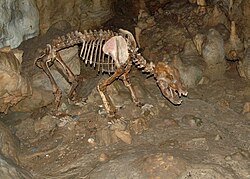Bear's Cave (Erpfingen)
48°22′15″N 9°12′55″E / 48.37083°N 9.21528°E
| Bear's Cave | |
|---|---|
| German: Bärenhöhle | |
 Reconstructed cave bear skeleton from Bear's cave | |
| Coordinates | 48°22′15″N 9°12′55″E / 48.37083°N 9.21528°E |
| Geology | White Jura |
Bear's Cave (German: Bärenhöhle) is a tourist cave in Sonnenbühl, Germany. It is named after the numerous cave bear skeletons found there, that likely inhabited the site 20,000 years ago.[1] With 80,000 visitors annually, it is the most visited show cave in Swabian Jura. Bear's Cave was formed in limestone of the White Jurassic,[2] and provided shelter for various types of prehistoric animals.[3] The caves have also been home to a theme park, Dreamland, since 1974.[4]
The cave is made up of two parts, the Karlshöhle, discovered in 1834,[5] and the Bärenhöhle, discovered in 1949.[6] The first part of the cave was initially vandalised and pillaged by visitors upon its discovery,[1] and was only reopened to the public upon the discovery of the second cave.
History
[edit]
The cave system was developed over a period of about five million years.[7] Fossils show that 20,000 years ago, bears, rhinoceroses and German cave lions roamed the area,[1] and full reconstructions of the bear's skeletons can be viewed on the site today. 8,000 years ago, it was inhabited by humans.[8] The stalactites in the cave were formed in White Jura. Since April 2013, the site has been one of the 26 information points of UNESCO Global Geoparks, Swabian Jura.[9]
Discovery of Karlshöhle
[edit]In 1834,[10] a local teacher known mononymously as "Fauth" accidentally discovered this part of the cave.[11] While collecting herbs, he dropped his Tabaksdose (tobacco packet) into a crevice, which he found he could widen and climb down.[12] The next day, him and his friends opened up the cave to tourists, who raided it for souvenirs, or vandalised its geology.[1] Today, the entrance Fauth found is named "Fauthloch" in his honour.[11]
Discovery of Bärenhöhle
[edit]In 1949,[10] Karl Bez, a recreational cave explorer saw a bat disappear through a crack. He climbed through and found 30 bear skeletons[12] in this undiscovered part of the caves.
Dreamland
[edit]The bear-themed park Dreamland (German: Traumland) has been operating in Bear's cave since 1974. The Ferris wheel with the highest location in Europe can be found there.
References
[edit]- ^ a b c d "Bärenhöhle". Schwaebische Alb (in German). Retrieved 2020-09-12.
- ^ ""Bärenhöhle" (Bears Cave)". www.geopark-alb.de. Retrieved 2020-09-22.
- ^ "Exploring the Swabian Alb". www.tourism-bw.com. Retrieved 2020-09-22.
- ^ "Startseite". www.freizeitpark-traumland.de. Retrieved 2020-09-12.
- ^ "Bärenhöhle". www.outdooractive.com (in German). Retrieved 2020-09-22.
- ^ "Bären- und Nebelhöhle". Kurverwaltung Bad Urach. Retrieved 2020-09-22.
- ^ "Show Caves of Germany: Bärenhöhle". www.showcaves.com. Retrieved 2020-09-12.
- ^ e.V, Deutsche Zentrale für Tourismus. "A warm welcome awaits at Traumland leisure park at Bärenhöhle cave". www.germany.travel. Retrieved 2020-09-12.
- ^ "GeoPark Schwäbische Alb". www.geopark-alb.de. Retrieved 2020-09-22.
- ^ a b "Bärenhöhle und Nebelhöhle in Sonnenbühl". GEFAKO GmbH & Co. KG (in German). Retrieved 2020-09-12.
- ^ a b "Höhlenwelten Sonnenbühl: Bärenhöhle". hoehlen.sonnenbuehl.de. Retrieved 2020-09-12.
- ^ a b "Schwäbische Alb - Höhlen - Kolbinger Höhle - Linkennbolds-Höhle - Bärenhöhle". www.reiserat.de. Retrieved 2020-09-12.
